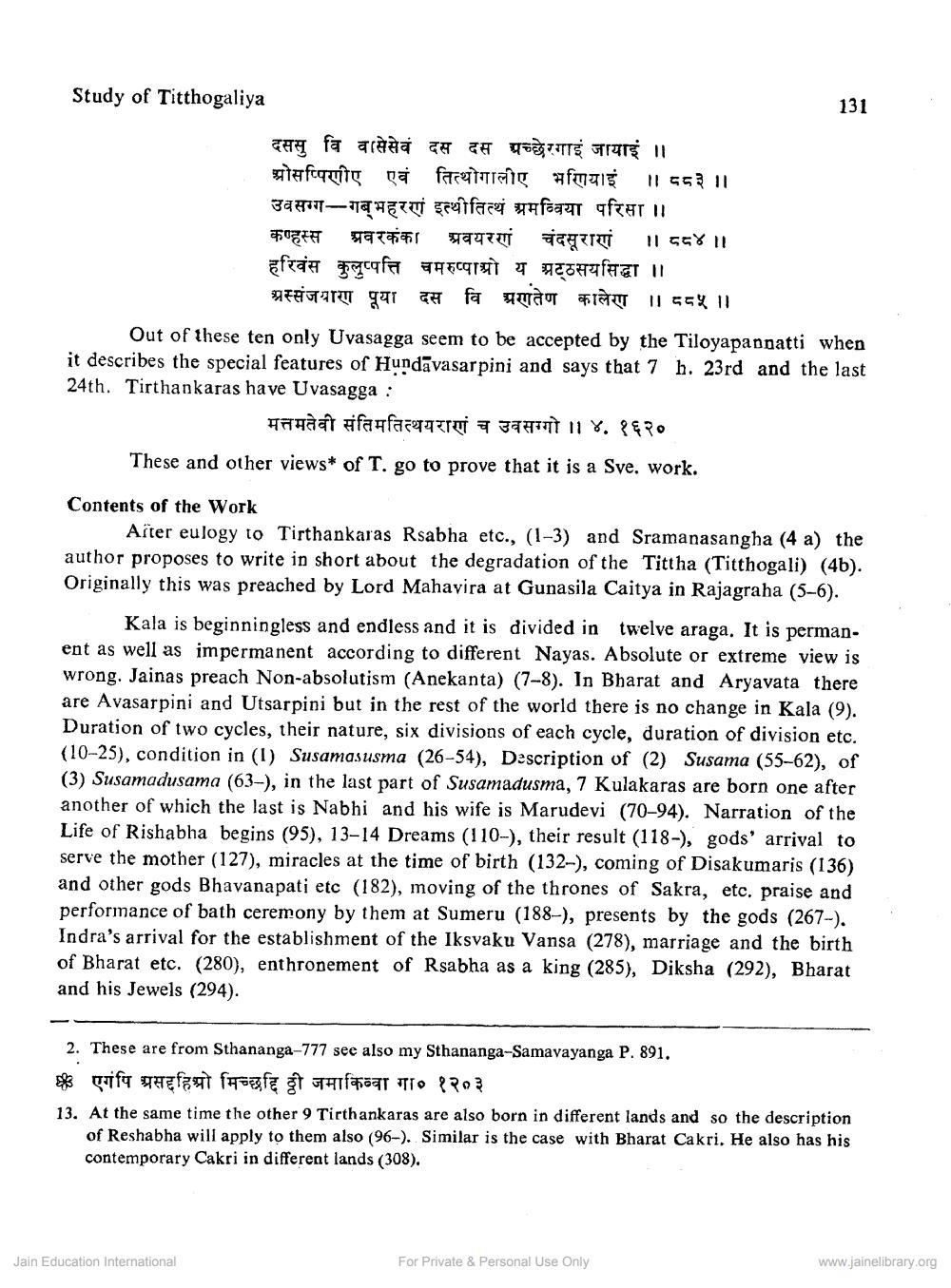Book Title: Study of Titthogaliya Author(s): Dalsukh Malvania Publisher: Z_Jinvijay_Muni_Abhinandan_Granth_012033.pdf View full book textPage 3
________________ Study of Titthogaliya 131 दससु वि वासेसेवं दस दस अच्छेरगाइं जायाइं । प्रोसप्पिणीए एवं तित्थोगालीए भरिणयाई ॥८८३ ।। उवसम्ग-गबभहरणं इत्थीतित्थं अमविया परिसा ॥ कण्हस्स प्रवरकंका अवयरणं चंदसूराणं ॥८८४ ॥ हरिवंस कुलुप्पत्ति चमरुप्पामो य अट्ठसयसिद्धा ।। अस्संजयाण पूया दस वि अगतेण कालेण ।। ८८५ ।। Out of these ten only Uvasagga seem to be accepted by the Tiloyapannatti when it describes the special features of Hundāvasarpini and says that 7 h. 23rd and the last 24th. Tirthankaras have Uvasagga : __ मत्तमतेवी संतिमतित्थयराणं च उवसग्गो ।। ४. १६२० These and other views* of T. go to prove that it is a Sve, work. Contents of the Work After eulogy to Tirthankaras Rsabha etc., (1-3) and Sramanasangha (4 a) the author proposes to write in short about the degradation of the Tittha (Titthogali) (4b). Originally this was preached by Lord Mahavira at Gunasila Caitya in Rajagraha (5-6). Kala is beginningless and endless and it is divided in twelve araga. It is permanent as well as impermanent according to different Nayas. Absolute or extreme view is wrong. Jainas preach Non-absolutism (Anekanta) (7-8). In Bharat and Aryavata there are Avasarpini and Utsarpini but in the rest of the world there is no change in Kala (9). Duration of two cycles, their nature, six divisions of each cycle, duration of division etc. (10-25), condition in (1) Susamasusma (26-54), Description of (2) Susama (55-62), of (3) Susamadusama (63-), in the last part of Susamadusma, 7 Kulakaras are born one after another of which the last is Nabhi and his wife is Marudevi (70-94). Narration of the Life of Rishabha begins (95), 13-14 Dreams (110-), their result (118-), gods' arrival to serve the mother (127), miracles at the time of birth (132-), coming of Disakumaris (136) and other gods Bhavanapati etc (182), moving of the thrones of Sakra, etc. praise and performance of bath ceremony by them at Sumeru (188-), presents by the gods (267-). Indra's arrival for the establishment of the Iksvaku Vansa (278), marriage and the birth of Bharat etc. (280), enthronement of Rsabha as a king (285), Diksha (292), Bharat and his Jewels (294). 2. These are from Sthananga–777 see also my Sthananga-Samavayanga P. 891. * एगपि असद्दहियो मिच्छद्दि ठी जमाकिव्वा गा० १२०३ 13. At the same time the other 9 Tirth ankaras are also born in different lands and so the description of Reshabha will apply to them also (96-). Similar is the case with Bharat Cakri. He also has his contemporary Cakri in different lands (308). Jain Education International For Private & Personal Use Only www.jainelibrary.orgPage Navigation
1 2 3 4 5 6 7 8 9 10
